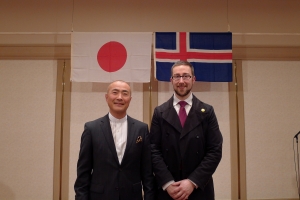I grew up in the small German town of Waldershof in the north east of Bavaria, close to the border with the Czech Republic. My parents both come from a farmers family, and I myself grew up with my older sister in a working class environment in rural Bavaria. After graduating from school I worked for several years as a Project and Product Manager for a mid-size company. I had the urge to learn more and quit my job in order to start studying at University. My first degree was at the University of Applied Sciences Hof, in the very north east of Bavaria. I studied Industrial Engineering and included a one year study at the University of Iceland. After my first degree I decided to come back to Iceland in 2008 to get a Masters in Environment and Natural Resources. My interest was in conflict management and protected area management. During this time, I was able to go on a short research exchange to the Hokkaido University. It was a very good experience and helped me a lot in my academic career. I decided to continue my studies and was accepted into the Ph.D. program in geography, with Professor Rannveig Ólafsdóttir as my supervisor. My project is focused on the impact of tourism on protected area.
Harald Schiller
In 2010 applied to the Watanabe Trust Fund and was awarded an eight months scholarship for a study period at the Hokkaido University.
Japan was not a total new country for me. From early age on, I had the interest in visiting Japan. After my first visit in 2009 and during my stay from August 2011 to April 2012, I became much more accustomed with Japan and Japanese people. I met old friends from 2009 and made many new friends. Many of the students at my laboratory were able to practise their English with me, and I started taking classes in Japanese too. Unfortunately, I was still not able to speak the language, but I discovered how it is possible to communicate with the little knowledge of language, and how to get to know with other people using intuitive language. It was fascinating also to experience that there is a different approach to problems. I learned that in many western nations one learns from its mistakes, in Asia one learns not to make mistakes. This fundamental difference has influences on the way how research is done and how people work in personal and business life. Sometimes is causes confusion and frustration, but also shows how important it is to strive for excellence is. I hope I can integrate this into my life in the future.
The Hokkaido University was an excellent choice for my study since many environmental condtions Hokkaido can be compared with Iceland. My supervisor, professor Tetsuya Aikho and other scholars at Hokkaido University are experts in fields, related to my study. When studying here, I could tap into this knowledge. Many researchers have been studying abroad so English is less of an obstacle as one might think. Froeing students at Hokkaido University have learned Japanese to be able to pursuit a degree at Hokkaido University. I was told administration and heard that the University is now working to also enable studies in English..
The research in the Research Faculty of Agriculture was very beneficial for me. On one hand, this department is very active in the researching protected area management. On the other, it offers many connections with researchers which work on different aspects of environmental impacts of tourism in protected areas. In addition to this it was beneficial for me to present my research methods and to get comments on how to improve my own research. During my stay here, it was a wonderful opportunity to do field work in Yakushima Island. It provided me with a new and different environment to analyse general applicability of my research. I am very grateful that Hokkaido University help me with some of the travel costs. Still, it was unfortunate not to find students in the similar field or level to have a dialogue and an exchange of ideas as I had hoped. This I am not sure if this difficulty laid within my selection of location, my lack of necessary language skills, or the cultural difference when it comes to academic discussions. Nevertheless the challenges during this exchange presented an opportunity to rethink the current path I have chosen and to expand my horizon. There is no formal exchange agreement between University of Iceland and University of Hokkaido and this caused some difficulty, but these difficulties were overcome with good help from my supervisor and the administrative staff.
From a personal point of view, it is my belief that the stay in Japan helped me to improve my research methods. During my exchange I presented my research at several occasions which gave the possibility to get feedback from others. My findings were presented at a conference in August 2012, and my professors comments were helpful in that regard. My stay in Japan has improved my academic skills and I was fortunate to be able to communicate with researchers in my field and with a similar research interest. I sincerely hope that my I first and second stay as an exchange student to the Hokkaido University could mark the beginning of a fruitful future collaboration between Iceland and Japan.
Harald Schaller

